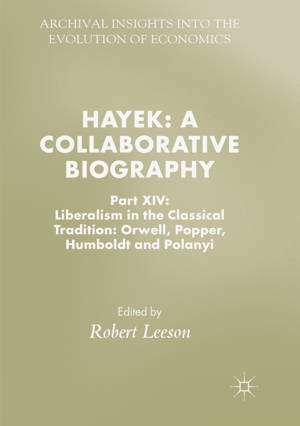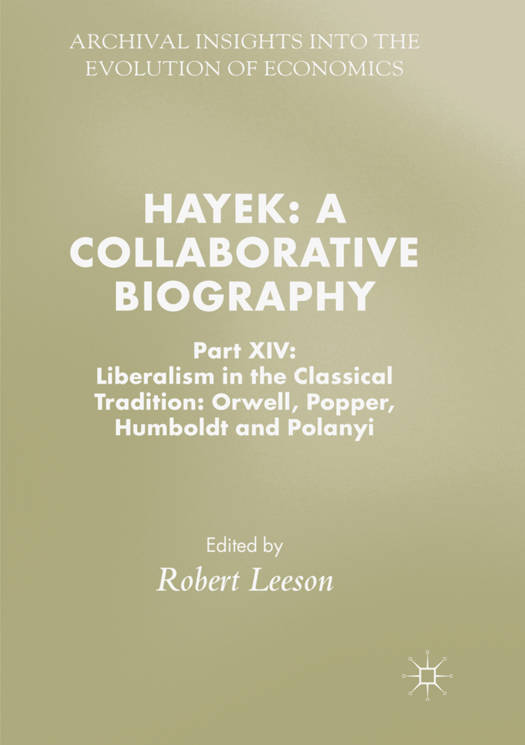
- Retrait gratuit dans votre magasin Club
- 7.000.000 titres dans notre catalogue
- Payer en toute sécurité
- Toujours un magasin près de chez vous
- Retrait gratuit dans votre magasin Club
- 7.000.0000 titres dans notre catalogue
- Payer en toute sécurité
- Toujours un magasin près de chez vous
Hayek: A Collaborative Biography
Part XIV: Liberalism in the Classical Tradition: Orwell, Popper, Humboldt and Polanyi
111,95 €
+ 223 points
Description
This latest volume in the Collaborative Biography of Hayek examines the interconnectedness between Hayek's (1944) The Road to Serfdom and George Orwell's Animal Farm (1945) and Nineteen Eighty-Four (1949); his relationship with Karl Popper and Karl Polanyi; and the work of Wilhelm von Humboldt. Mises had a 'deep emotional attachment' to the 'free' market and Hayek believed that 'science' was driven by shallow emotions.
Hayek believed in 'democracy as a system of peaceful change of government; but that's all its whole advantage is, no other.' He felt democracy simply made it possible to get rid of the government 'we' dislike. Hayek bemoaned the decay of superstition -- the 'supporting moral beliefs' - that are required to maintain 'our' civilization. Yet his Road to Serfdom neglected 'another road to serfdom' - the possibility that there were multiple threats to individual freedom -not just State power. In contrast, many other scholars and public intellectual warned of the dangers of the concentration of power in institutions other than the State. Today those fears have materialized in the guise of wealthy mega-corporations and billionaires whose influence on government, on elections, on popular culture and on the dominant ideology, have been able to change the rules of the market in their favour - so that 'we' have now become trapped in a new kind of serfdom. With contributions from a range of highly regarded scholars, this volume continues the Biography's rich exploration of Hayek's work and beliefs.
Hayek believed in 'democracy as a system of peaceful change of government; but that's all its whole advantage is, no other.' He felt democracy simply made it possible to get rid of the government 'we' dislike. Hayek bemoaned the decay of superstition -- the 'supporting moral beliefs' - that are required to maintain 'our' civilization. Yet his Road to Serfdom neglected 'another road to serfdom' - the possibility that there were multiple threats to individual freedom -not just State power. In contrast, many other scholars and public intellectual warned of the dangers of the concentration of power in institutions other than the State. Today those fears have materialized in the guise of wealthy mega-corporations and billionaires whose influence on government, on elections, on popular culture and on the dominant ideology, have been able to change the rules of the market in their favour - so that 'we' have now become trapped in a new kind of serfdom. With contributions from a range of highly regarded scholars, this volume continues the Biography's rich exploration of Hayek's work and beliefs.
Spécifications
Parties prenantes
- Editeur:
Contenu
- Nombre de pages :
- 396
- Langue:
- Anglais
- Collection :
Caractéristiques
- EAN:
- 9783030068479
- Date de parution :
- 22-12-18
- Format:
- Livre broché
- Format numérique:
- Trade paperback (VS)
- Dimensions :
- 148 mm x 210 mm
- Poids :
- 485 g

Les avis
Nous publions uniquement les avis qui respectent les conditions requises. Consultez nos conditions pour les avis.





